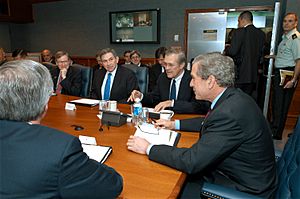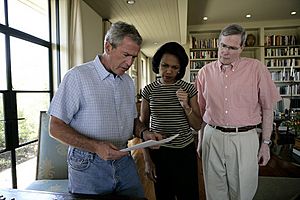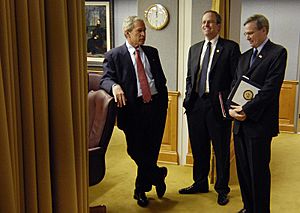Stephen Hadley facts for kids
Quick facts for kids
Stephen Hadley
|
|
|---|---|
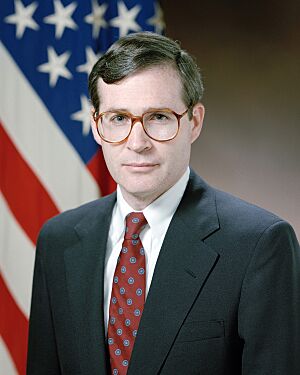
Official portrait, 1989
|
|
| 20th United States National Security Advisor | |
| In office January 26, 2005 – January 20, 2009 |
|
| President | George W. Bush |
| Deputy | Jack Dyer Crouch II James Franklin Jeffrey |
| Preceded by | Condoleezza Rice |
| Succeeded by | James L. Jones |
| 21st United States Deputy National Security Advisor | |
| In office January 20, 2001 – January 26, 2005 |
|
| President | George W. Bush |
| Preceded by | James Steinberg |
| Succeeded by | Jack Dyer Crouch II |
| 3rd Assistant Secretary of Defense for International Security Policy | |
| In office June 23, 1989 – January 20, 1993 |
|
| President | George H. W. Bush |
| Preceded by | Ronald F. Lehman |
| Succeeded by | Ash Carter |
| Personal details | |
| Born |
Stephen John Hadley
February 13, 1947 Toledo, Ohio, U.S. |
| Political party | Republican |
| Spouse | Ann Hadley |
| Children | 2 |
| Education | Cornell University (BA) Yale University (JD) |
Stephen John Hadley, born on February 13, 1947, is an American lawyer and a very important government official. He worked as the 20th United States National Security Advisor from 2005 to 2009. This means he was a top advisor to President George W. Bush on matters of national safety and foreign policy. Before that, he was the Deputy National Security Advisor during President Bush's first term.
Contents
Early Life and Education
Stephen Hadley was born in Toledo, Ohio. His mother, Suzanne, was a homemaker, and his father, Robert, was an electrical engineer. He grew up in South Euclid, Ohio, near Cleveland.
When he was young, Hadley read a book called Advise and Consent. This book made him very interested in how the government works. He was even elected student body president at Charles F. Brush High School. He graduated from high school in 1965 as the top student in his class.
College and Law School
Hadley went to Cornell University and earned a degree in government in 1969. While there, he was part of a fraternity and the Cornell University Glee Club. He also joined a special society called Quill and Dagger.
After Cornell, he studied law at Yale Law School and received his law degree in 1972. He was an editor for the Yale Law Journal. He was also a classmate of Hillary Clinton in law school. In 1972, he joined the U.S. Navy as an officer through a special program at Yale.
Career in Government
Stephen Hadley has had a long career helping the U.S. government with important decisions about national security and foreign policy.
Military Service
Hadley served as an officer in the United States Navy from 1972 to 1975. During this time, he worked as an analyst for the Department of Defense.
Early Government Roles
From 1974 to 1977, Hadley was part of the United States National Security Council staff under President Gerald Ford. The National Security Council helps the President make decisions about national security.
Later, from 1986 to 1987, he helped a special board created by President Ronald Reagan. This board looked into a situation known as the Iran-Contra affair.
During the time of President George H. W. Bush, Hadley worked at the Pentagon. He was the Assistant Secretary of Defense for International Security Policy from 1989 to 1993. In this role, he helped shape defense policies for NATO and Western Europe. He also worked on issues related to nuclear weapons and arms control. Hadley helped with talks that led to important agreements called the Strategic Arms Reduction Treaties (START I and START II).
Working Outside Government
When the Democratic Clinton administration was in power (1993–2001), Hadley worked as a lawyer in Washington, D.C.. He helped U.S. and foreign companies with international business and legal issues. He also worked for a consulting firm called The Scowcroft Group, helping U.S. companies do business overseas.
George W. Bush Administration
Campaign and Transition
Stephen Hadley was a key advisor to George W. Bush during his 2000 presidential campaign. He advised Bush on foreign policy and defense. After Bush won, Hadley helped with the transition to the new administration, especially for the United States National Security Council.
Deputy National Security Advisor
From January 2001, Hadley served as the Deputy National Security Advisor. In this role, he helped the President with national security matters.
In 2002, he was part of a group called the White House Iraq Group. Hadley later admitted that he made a mistake by allowing a disputed claim about Iraq's search for nuclear materials to be included in President Bush's speech in 2003. He offered to resign, but President Bush did not accept his resignation.
National Security Advisor
On January 26, 2005, Stephen Hadley became the United States National Security Advisor. He took over from Condoleezza Rice, who became the Secretary of State. As National Security Advisor, he was the main foreign policy advisor to President Bush. He also managed the National Security Council staff.
Hadley played a big part during the Iraq War. He was involved in the "surge" strategy in 2007. This strategy increased the number of U.S. troops in Iraq to help stabilize the country and fight against groups causing trouble. He also helped manage the shift from large military operations to more focused efforts. Hadley worked to explain to the public why the "surge" was important.
Hadley was known for not seeking public attention. He preferred to work behind the scenes. He also helped with talks called the Six-Party Talks. These talks aimed to stop North Korea from developing nuclear weapons.
Later Career
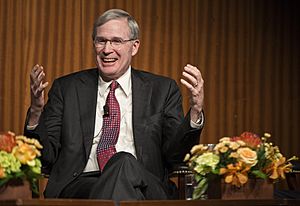
After leaving the White House in 2009, Hadley became a senior advisor at the United States Institute of Peace in Washington, D.C. In 2014, he was elected chairman of its Board of Directors. This institute works to prevent and resolve conflicts around the world.
In 2018, a special group he was part of released a report. This report warned that the United States needed new ways to stop violent extremism in unstable countries.
Hadley is also a co-founder of a consulting firm called Rice, Hadley, Gates & Manuel. He started this firm with Condoleezza Rice and others.
In 2013, Hadley supported same-sex marriage in a Supreme Court case. He also shared his thoughts on the Iraq War's tenth anniversary.
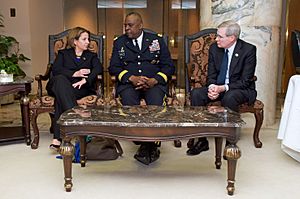
Hadley is a member of the Council on Foreign Relations, which is a group that studies foreign policy. He has also been part of other important boards that advise the government on defense and security. He is an Executive Vice Chair on the Board of Directors at the Atlantic Council and is on the Board of Directors at the defense company Raytheon.
In January 2024, Hadley visited Taipei as part of a U.S. group after Taiwan's presidential election.
Personal Life
Stephen Hadley lives in Washington, D.C., with his wife, Ann. Ann is a lawyer for the Justice Department. They have two daughters.
Honours
See also
 In Spanish: Stephen Hadley para niños
In Spanish: Stephen Hadley para niños


